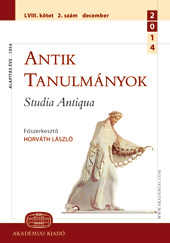„Aki az állattal kegyetlen, nem lehet emberséges ember”. Ponori Thewrewk Emil és az állatvédelem a régi görögöknél
Emil Ponori Thewrewk and the Humane Treatment of Animals in Ancient Greece
Author(s): Balázs GaálSubject(s): History of Law, Ancient World
Published by: Akadémiai Kiadó
Keywords: Emil Ponori Thewrewk; torture of animals; protection of animals; animal cults; totemism; transmigration of souls; animism; vegetarianism; ancient Greek legislators; Areopagus;
Summary/Abstract: Emil Ponori Thewrewk, who is regarded as the first great figure and founder of classical scholarship in Hungary, is also the only Hungarian scholar who has ever written on the humane treatment of animals in ancient Greece. His predilection for the subject can be explained by the impact of an intellectual milieu on the minds of Ponori Thewrewk, his close relations, and his acquaintances. The argumentation used by all animal rights movements at the time, based upon the a minore ad maius principle (“he who is cruel to animals shall also be cruel to humans”), can be traced in Ponori Th ewrewk’s short article which makes a distinction between old naive religious beliefs leading to an abstention from animals and Athenian legal cases where cruelty to animals had been punished as a sign of a future inhumanity to fellow humans. In the first part of my study I shall try to explore Ponori Thewrewk’s personal inclinations for, and connections with, the animal movements of the time; then in the second part I shall go through all ancient motivations, religious as well as legal, mentioned by Ponori Thewrewk for treating animals well, in order to get a full picture of ancient Greek attempts at humane treatment of animals as seen by Ponori Thewrewk and his contemporaries.
Journal: Antik Tanulmányok
- Issue Year: 56/2012
- Issue No: 1
- Page Range: 17-63
- Page Count: 47
- Language: Hungarian
- Content File-PDF

